#gintama meta
Explore tagged Tumblr posts
Text
I just finished Gintama and I'm still in awe. It's been a day and I still don't know how to collect my words of how deeply this anime struck me.
Utsuro was a beautiful villain. The way I interpret him is that he is almost pure yin - cold, dark, destructive, and all consuming, like, well, an 虚 ("utsuro", void.) But in East Asian cosmology, while yin is death, it is also fertility. It is the feminine component of the universe and required for land and animals to reproduce. So within a field of yin, there will always be a seed of yang.
This seed of yang is of course, Yoshida Shouyou. Just as yin inevitably grows yang, Utsuro talks of Shouyou's emergence as inevitable in episode 328.
"The one that hated humans, the one that feared humans, and the one that longed to be human... They were all me. It was inevitable that he would appear to stop them. The only Utsuro that stood up to Utsuro."
He even usually wears white compared to the black of Utsuro's cloak. Shouyou is warm, kind, nurturing, and active; it's said he never stopped fighting against Utsuro, even if at first he lost. And arguably that fighting is what got him killed. Utsuro slays him internally as Gintoki slays him externally, and when his body is burned in fire - a classic symbol of yang - Utsuro reemerges. The seed has sprouted, grown, withered, and returned back to fertilise the earth. Yang flows back into yin.
What I find interesting is the decidedly feminine metaphors that Oboro and Utsuro himself use to describe the formation of his different personas. He is said to have "given birth" to countless versions of himself (again also from episode 328), which further strengthens the association between Utsuro and yin.
This is not the first time a birthing/maternal metaphor has been used in Gintama. Consider Shouyou's speech to a child Gintoki:
"There's no difference between a monster and the child of a monster. They are both inhuman beings that are only born within a bloody pool of sin. And a monster's sword cannot cut another monster. So, Gintoki, stop trying to grow stronger by imitating me... You have to grow stronger than me by using your own sword, the sword of a human." - (episode 317.)
If in this metaphor, Utsuro is the parent and Shouyou is the offspring, then what does that make Shouyou? Shouyou subtly implies he considers himself a monster. Is this true? If you view Shouyou as a parental figure to Gintoki, Katsura, and Takasugi, then what does that make them?
Gintoki was called a corpse eating demon as a child, and by the time he was fighting in the Joui wars and forced to execute Shouyou, he had not shed that reputation. He instead became known as the Shiroyasha - white demon. Clothed in the colours of yang like his master who longed to be human, but a monster nonetheless. And a monster's sword cannot cut another monster. That is why when Gintoki kills Shouyou, Utsuro is born, and the cycle starts anew. It is only after 300+ episodes of character development that he becomes human, and can put an end to Utsuro.
"The people here must be what you were to me. Just as the eternal monster from that day became human by meeting you... Meeting you kids, the little monster with sad eyes from that day has also become human, hasn't he?" - (Shouyou to Gintoki in Gintama: The Final.)
But the cycle is never over. A baby implied to be Takasugi's reincarnation is born in the Altana gates at the end. At first I thought this was a cheap trick, and that Sorachi only did this to keep fans happy, but it does fit the theme of eternity and neverending cycles.
Gintama, to me, is about cycles, and the difference between productive and unproductive cycles. The Naraku's name refers to a sort of Buddhist hell, and they dress like Buddhist monks. The relevance of the Buddhist theme of reincarnation in regards to Utsuro's story should be obvious. But instead of a march towards enlightenment, Utsuro's numerous lifetimes are more like an ouroboros eating it's own tail. He did unto others what was done unto him, escalating into a plot to destroy Earth, which got him nowhere but perpetuating pointless samsara. He destroys himself as he begets himself, experiencing moral degradation and isolation as he shies away from even his other selves.
Or a cycle can be like making a philosopher's stone, which is what Gintoki experienced: a process of continuous refinement that produces objects of further and further purity. To use Buddhist terms, enlightenment is an ongoing process. The work of becoming human takes as long as your life will. And Gintoki is made human by his relationships with Shinpachi, Kagura, and every single person he met over the course of the story, while Utsuro remained so focused on himself, he destroyed his other selves.
Utsuro recognises his mistake upon his death:
"Humans are hollow beings. But because they know that, they take root in the heart of others, never fading, even after death, and continue to live forever, is it?" - (Gintama: The Final)
His hollowness and eternity did not have to mean all this pain. He denied the version of himself, Shouyou, that went against his omnicidal death wish, and was life giving instead. In giving life, Shouyou became mortal, and was given death. In death, Shouyou became more influential and powerful than Utsuro, having touched the heart of people who would come back to defeat him. The immortal becomes mortal becomes immortal. Yin flowing back into yang flowing back into yin.
In the end, everything goes back to where it started, yet everything is new again. The Yorozuya are back, and Edo is still Edo, even as Tokyo looms on the horizon. I can only hope for the baby we see at the end, that if they are immortal, they will have a kinder life than Utsuro/Shouyou did. That they will be more human than monster. The monster's child became human, after all.
#gintama#gintama meta#gintama spoilers#utsuro gintama#yoshida shouyou#i love utsuro and this is my love letter to him
61 notes
·
View notes
Text
Sakata Gintoki, king of static characters who doesn't really change throughout the series (yes I know it's the definition) but impacts his environment so much you could almost believe he does.
#Gintama#Sakata Gintoki#My Gintama posts#Gintama Meta#the guy's the same but bc he just adapts to whoever's in front of him; stuff that was already there for him seems new to us as an audience#aka Character Development can either mean Character Exploration or Character Evolution#his evolution happened when Shouyo was still alive
32 notes
·
View notes
Text
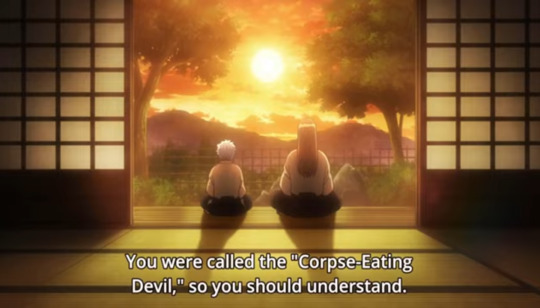

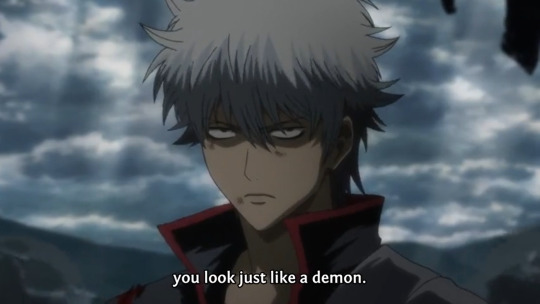
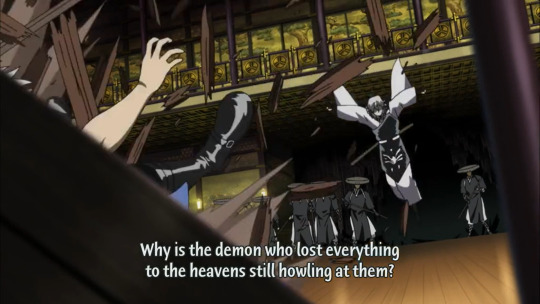
loses 10 years of my life and has 20 added in an endless loop thinking about how gintoki is always primarily described by his inhumanity first and foremost because for all that he is an idiot goofball he is also a survivor of one of the bloodiest massacres in his series ever since he was a child and even surrounded by family and friends he has no qualms whatsoever with all the blood on his hands and equally has no problem further spilling blood to protect what he loves <- primary indication of humanity in gintama is using a sword to protect vs using a sword to kill and the measure of ones soul (and even gain one) is in how they weild a sword
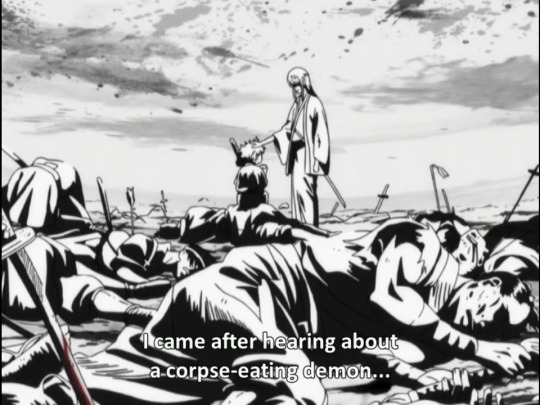
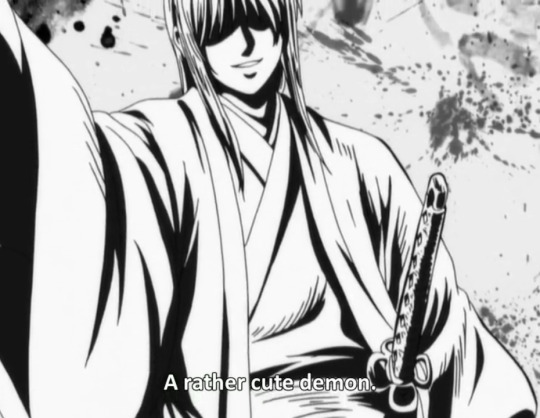
246 notes
·
View notes
Text
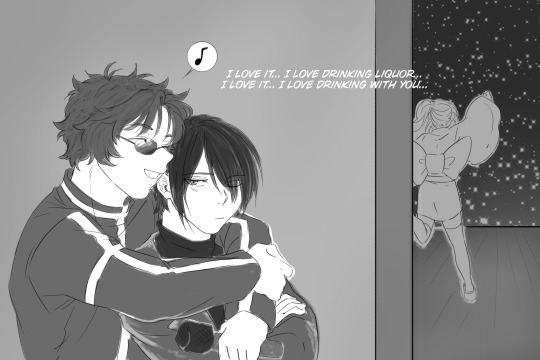
There's a whole ass AU behind the stupid drawing based on a stupid conversation with @tamanone. Something about Tatsuma and Takasugi forming a boy band and a meta humor about their voice actors having been in a band together. And them guesting in an Otsuu concert. There are a lot of stupid thoughts involved. And then tamanone described a stupid cute scene (Tatsuma serenading Takasugi in the backstage with Otsuu's Omae to p-chan nondakure) that I can't do any justice. I tried tho.
#I would elaborate but if I could I wouldn't be drawing comics#love the halfbaked AU tho. and it all started from a meta joke XD#nothing i draw would ever capture the fun in learning about a song made by Sugi's VA for a character in another anime that fits him so much#among other things#thank you tamanone for enabling me#and sorry to the people I will subject once again to my sakataka brainrot#takasugi shinsuke#sakamoto tatsuma#SakaTaka#gintama
25 notes
·
View notes
Text
Rewatched Fuyo arc and gintama mutuals you are encouraged to remind me to make the [Silver Soul + The Final movie] recreation AMV out of only the shots available from it. I’m so convinced it’s doable in like 70% at its essence and ugh. Anybody wanna be put down like a dog after realising the parallels
#d0 stuff#yes yes Fuyo is a Shouyouface and Tama is in part him too and her father too ok ok ok#let’s stop here before I explode#will make a proper meta post later#gintama
7 notes
·
View notes
Text
Joui 4 headcanon after months of silence: they were all equally feared on the battlefield of the Amanto War for entirely different reasons. Gintoki's the only one who got folkloric status because his signature bright white clothing and hair cut an easily memorable image amidst so much bloodshed and dark palette's, but if anyone time travelled back to that period or spoke with people who knew the four of them during that time, you'd learn that Katsura, Takasugi and Sakamoto were all equally terrifying opponents to go up against
Here's my breakdown that matters to nobody but myself. Gintoki is a tank player. He can take hit after hit after hit and still get back up and deal just as much as he takes, hence his demon moniker, but if you think he's the only one to take down hoardes by himself you'd be wrong because Katsura was deadly efficient, always aiming for quick kill strikes and moving with a fluid grace few could match
In contrast, Takasugi and Sakamoto were similar fighters, being quick and agile on the battlefield with their core differences being that Takasugi had a similar defence stat as Gintoki whereas Sakamoto's unmistakable laughter sounded so deranged and manic to the minds of already paranoid soldiers that it could strike paralysing fear into most mobs
#gintama#joui 4#meta post#I also still believe sakamoto was the most deranged of the four In General#but that's neither here nor there
46 notes
·
View notes
Text
It's quiet in the wake of the fire, of Shoyo's arrest, of their home being destroyed. The muffled sobs peter out, and they're left to sit in their misery, not knowing what to do when the little they had has been cruelly ripped away from them.
Then Kentaro starts crying. Wailing, really, like babies do, and it snaps Gintoki back to reality.
His legs nearly give out when he stands, and his arms ache from being pulled too harshly, but he makes his way to Takashi, who's overwhelmed by the screeching infant they must have carried out of the temple. They shove Kentaro onto him with obvious relief, and on a normal day - a better day - Gintoki would complain about always getting stuck on babysitting duty. Instead, he rocks the brat back to sleep and realizes they’re going to have to dump him in some orphanage.
Already one person he can’t look after for Shoyo.
#gintama#I was doing a 10 minute prompt excersise and as soon as I read 'a baby cries' the gintabrainrot rocketed me to this night#I had a line about formula and then I remembered formula didn't exist yet#and then I had a mini panic about how it doesn't make any sense for the baby to be with them if they don't have assess to any breast milk#but whatever he can just be like a year old or something idk#fic scraps#I am forever thinking about Gintoki being the big bro of Shoka Sonjuku#where was the one meta post about how he probably did look after some babies for the other kids
19 notes
·
View notes
Text

This is unironically Yamazaki's villain origin story in the Popularity Poll Arc in Gintama
6 notes
·
View notes
Link
Chapters: 1/? Fandom: 銀魂 | Gintama (Anime & Manga) Rating: General Audiences Warnings: No Archive Warnings Apply Additional Tags: Meta, Analysis, not fanfiction, Symbolism, Posts one part a day Summary:
An analysis on Gintama's symbolism. Featuring: the sky, the Sun, the Moon, the dragon, and many more.
this has been months in the works!!
4 notes
·
View notes
Text
how come does this "high-end literature" book im reading for english class seem to do its meta thing worse than how gintama does meta
2 notes
·
View notes
Text
Me every time someone goes through my tags especially those that go back to over 10 years when I know I don't hold the same opinions I did before on a few things:
"please don't like those please don't like those please don't like those but also please don't judge me for them"

#Gintama#I've got perspective now#I am an old person with better meta knowledge#grnated most hasn't changed but still
7 notes
·
View notes
Text
you should never go from reading gintama meta to taking biology notes i'm in my class right now like damn..... stem cells are kinda shouyoucore
36 notes
·
View notes
Note
imisshomestuck popping off with the jake meta, damn
i agree completely, but also this paragraph
"Unhappy endings are better because of that. Fuck that. That's not why people read stories. People read them to see the ideal, to feel the potential of a character and then later see their faith and hope be rewarded. Reading a fictional story shouldn't be like gambling where you hope the writer ends up closing a characters story well and having them turn into the best version of themselves. Why do so many writers have the idea that reality always ends up being shitty and disappointing! Stories should too! It's like that stupid Mad at Disney song. We should all be bitter and nihilistic. The 1990s nihilism trend did a number to these mother fuckers. They think that trying is pointless and flaws are weights around our ankles that make it impossible to win the race of lie."
yes holy shit im so fucking TIRED of nihilism in stories, yet it seems its all i can find in everything nowadays (example: GOT, that was ass and im tired of pretending otherwise, all the good interesting main characters dying triggered my homestuck ptsd). and i fucking hate how this garbage webcomic has ruined my perception of character interaction for me forever because nothing comes even close! and all i get in fanworks is davekat uwu shit or discourse! im so fucking pissed! i hate hussie, hiveswap, the epilogues and hsbc and this idiotic fucking nu fandom!
someone send some book/shows/manga recs plz
in exchange i can give some too, if you like homestucks minimalist art style give alex toths works a try, his artbooks in particular are great. invader zim, irkens is where hussie stole the trolls and alternia from. also emily the strange, the maxx (1993), sam & max. for manga, lupin iii is fun.
There is only such much nihilism I can take before it becomes annoying that we get it, everything fucking sucks. Worse if said media tells me that I'm an idiot for even caring for watching/reading the series in the first place. At this point, it makes one question then who the hell you are writing for at this point if you slap the audience in the face and purposely make yourself feel like shit. As for series: Smiling Friends, Mashle: Muscles and Magic, Crayon Shin-chan, Gintama, Sgt. Frog/Keroro Gunsou,
27 notes
·
View notes
Text
Creo que al inicio, los que han estado pidiendo desesperadamente un personaje masculino de cabello largo se volverán absolutamente salvajes, comenzarán a ahorrar protogemas religiosamente, prepararán sus bolsillos para hacer la inversión más grande de su vida, porque, ¡maldita sea, un personaje masculino con cabello largo y sedoso, nada menos!
Entonces, después vendrán los críticos a dar sus análisis sobre el personaje y su kit de habilidades: Un soporte hydro, al parecer (Que repetitivo, dirán muchos. ¡Necesitamos más DPS Hydro! Añadirán los main Hydro, hartos de que al parecer Hydro es sinónimo de sanador dentro del juego). Vendrán los detractores, tal y como con Bennett y Kazuha lo van a hacer trizas, luego lanzaran sus restos al barro y comenzarán a burlarse de todo aquel que esté ahorrando para este hilarante personaje de largo cabello sedoso, que, según sus propias predicciones, será olvidable y no va a proporcionar nada sustancioso al meta (Cabe destacar, que para este momento, solo estarán las filtraciones, de, repito este punto muy importante, este personaje masculino de cabello largo y sedoso)
Comienzan a verse videos por Youtube, posibles builds para el personaje, ya que, según las filtraciones, puede escalar tanto con HP como con ataque porcentual; así que comienzan los debates, ¿Un Katsura híbrido, quizá será mejor utilizarlo solo como un soporte para personajes DPS o será factible utilizarlo para crear grandes ráfagas de daño? Los main Ayato y los main Nilou están temblando en sus sillas, esperando este bono de daño que proporcionará Katsura para hacer números más grandes sin comprometer las composiciones elementales que tienen en la manga. Los fans absolutos del estilo de juego, también tiemblan en sus sillas, tienen a Beidou y YunJin en sus equipos, haciendo counters que destrozan por completo la vida de sus rivales, están sedientos, esperando obtener a este nuevo personaje para añadir a su colección, los que planean utilizar a Katsura para subir sus videos de Youtube con cifras que rondan el millón, comienzan a guardar sus mejores cáliz de bono de daño hydro, sus arenas de vida o ataque, definitivamente muchas Yelan y Nilou se van a ver desprovistas de sus artefactos una vez este personaje masculino de cabello largo y sedoso sea jugable. Así como ocurrió con Shenhe, con Kazuha y tantos otros en su momento, muchos deciden simplemente ahorrar para otros personajes, encogiéndose de hombros, a pesar de que este personaje masculino tenga este cabello largo y sedoso tan único.
Entonces, ¡finalmente llega el gran día! Y todos los que han lanzado en el banner se ponen manos a la obra. En los próximos días, comienzan a verse más videos, capturas y esquemas en las redes sociales sobre Katsura y resulta ser (Como no podría ser de otra forma) Es que su estilo de juego es absolutamente divertido:
En realidad resulta ser un personaje autosuficiente, sus ataques y animaciones son prolíficas (Vamos a mencionarlo una vez más, pero ver su cabello largo y sedoso ondearse con cada ataque que realiza le ha ganado un puesto entre los mejores cabellos Pantene dentro del fandom, en este punto Zura está compitiendo entre los primeros puestos a mejor waifu de Genshin) El asunto con Zura, es que tiene mucho sustento, dado a la pasiva que aumenta su velocidad de movimiento y disminuye su consumo de estamina, es sencillo esquivar y dejar un par de ataques básicos aquí y allá mientras se elimina el enfriamiento de "Retribución táctica", así mismo, dado que su definitiva sana, suele armarse con mucho HP, da un bono de ataque e incluso infunde con hydro que desata buenas reacciones elementales, Katsura es casi inmortal.
Aún así, tiene algunas desventajas, debido a estas infusiones hydro, Katsura es utilizado como buffer y sanador para otros DPS hydro o en equipos de sobreflorecimiento, dado que el daño producido por las semillas dendro puede ser contrarrestado por su ultimate, así que, los niveles de recarga de energía deben ser altos, equilibrados con una tasa decente de HP y ataque. Así que, tarda un tiempo tener a Katsura armado correctamente.
Al inicio, muchos creen que la tercera pasiva: "Alboroto Shintoukei", es un desperdicio, ya que, teniendo características de sanador y counter, pues... cualquiera podría pensar que nunca se le daría uso. ¡Pero! Es en abismo donde esta característica comienza a brillar; cuando resulta ser que en medio de la batalla del piso 12, los jefes atacan al mismo tiempo, y terminas sin uno de los miembros de tu equipo, el bono de daño y las mejoras en "Retribución táctica" se activan, de repente, en unos segundos la vida de los enemigos disminuye, finalmente el combo es rematado con las bombas de daño hydro de su ultimate. El abismo se completa. Katsura resulta ser una máquina imparable. De repente es Tier SS dentro de las estadísticas del juego.
Zura but in genshin
Or at least some thoughts about how his gameplay could be if there ever is a crossover
I wrote this and Im working on a story quest for gin but i doubt it will ever be completed so Ill post this that is somewhat finished
Very very rough, I wrote this thinking about fitting his character and personality, not balance, so it'll may be too op or too weak, and also I don't understand very well how this kit thing works (like scaling and shit)
I thought about him like a support, good for quick swaps, like his role as a general possibly can be, but also as a capable dps when the conditions are right (Like the difference between Katsura and Zura)
Also happy b-day, ya dumbass
Katsura Koutarou
A genius general and a accomplished intellectual, the only thing vaster than his intelligence is his lack of common sense.
Auto Attack - Shouka Bladework: Elegant Style. The charged attack is a stab that acts kinda like polearms charged attacks, but the rest is standard sword character.
Skill - Tactical Retribution; Counter like Beidou/YunJin. It lowers the physical and elemental resistance/defense of the enemies that were hit by it by 15%. Damage scales with attack
Burst - The General's Game; Katsura deploys a AoE. Standing inside the AoE will heal and also boost his and his teammates attacks, scaling with his HP stat. Enemies standing inside the AoE will have their physical and elemental resistance/defense lowered, also scaling with his HP (The maximum value is 50%, also counting the debuff from Tactical Retribution). If Shintoukei Rampage is in effect the healing, buffs and debuffs are replaced by hydro damage that scales with attack. (It's uno)
Passive 1 - Zura janai!; if the skill is pressed just as Katsura is attacked, Katsura will counter the attack with full charge
Passive 2 - Runaway Koutarou; Katsura running speed gets a buff when he enters combat, sprinting and running stamina costs are also lowered.
Passive 3 - Shintoukei Rampage; When his teammates are down, or he is alone in a team, his Attack gets a 150% buff, Tactical Retribution releases fully charged with a tap, Tactical Retribution's full counter also gains 25% more damage, and The General's Game now has bombs that deal hydro damage. But the buffs and debuffs are erased.
Constellations
C1 - After using Tactical Retribution, Katsura attacks are imbued with hydro for 5 seconds. (It can generate elemental particles)
C2 - When used as a perfect counter, Tactical Retribution has a 25% chance of recharging immediately.
C3 - Increases the level of The General's Game by 3.
C4 - Shintoukei Rampage gives an extra 50% attack buff when Katsura has less than 40% of his HP.
C5 - Increases the level of Tactical Retribution by 3.
C6 - When Shintoukei Rampage is in effect, Katsura buffs and debuffs aren't erased anymore. (The healing still is)
#gintama#Genshin#katsura kotarou#genshin crossover#Genshin meta#Estoy divagando#De repente estoy absolutamente obsesionada con este crossover#Katsura sería el primer personaje masculino en tener cabello largo dentro del juego#El fandom de Genshin simplemente sería una locura por un par de meses por esto
13 notes
·
View notes
Text
There's something so giggle inducing about Shinpachi saying "I'm a minor" when he gets offered sake in ep 57 because like. It really is a generational difference. Sakamoto and Gintoki were getting piss drunk and visiting brothels and shit when they were 15-17 during the Amanto War because you could die at any moment so you might as well live it up while you could and Shinpachi by contrast does not really have to worry about that, so he has the freedom to say "no" to those things, and it's just a funny little inconspicuous moment that kind of solidifies that gap in generations
36 notes
·
View notes
Note
hello! I read your Tae meta from last year and just wanted to say it was great and really gets to the bottom of the problems with how Sorachi handled Otae. My (unasked for ;)) two cents is that I think he was going for GinTae endgame but then changed his mind somewhere before Lesson 238 which I read as his way of giving a 'this is how it would happen but I'm not going to do it' resolution for GinTae. And it's fine to drop the romance but knowing he's not going to make any couples endgame and 1/2


Hi! First of all, thanks for reading and taking your time to send this to me, I really like hearing other people's thoughts! I hope you don't mind that I combined both asks, given that they've points in common and I already had a draft of the one I received a while ago 🙈 This made me realize that I hadn't thought about it too much before… Even if I've talked about this topic with other people before, usually, the conversation ends with us agreeing and moving on to other topics lol so I think this is the first time I'm analyzing it. I'll try to do it from both the characters' perspective and Sorachi's intentions as the story's author. Before continuing, I want to clarify that my intention isn't to convince anyone to stop liking it, I just wanted to explore this topic and wow, did I explore it, because it ended up being much longer than expected 😂

That said, I think one of the biggest reasons why many of us thought Tae was going to be Gintoki's main love interest is because of the setup. Tae is the first woman from the main cast to appear in the series, and her dilemma kickstarts the story and allows for the formation of the Yorozuya as we know it. Moreover, she's Shinpachi's older sister and also develops a strong bond with Kagura, so it was expected that she would also develop a strong romantic bond with Gintoki, connecting her to the main trio of Gintama.
However, as I mentioned in the previous post, things started to change with the introduction of Kyuubei, which solidified the Kondo-Tae-Kyuubei love triangle, and then with the introduction of Tsukuyo. I watched a video by Abbie Emmons titled "7 Deadly Romance MISTAKES Writers Make ❌ avoid these chemistry killers!" to help identify some points in the relationship between Gintoki and Tae, although I must mention that I don't think these were mistakes on Sorachi's part, quite the opposite, they were very conscious decisions. I won't go point by point; instead, I'll summarize the intent of the message.
Half of the video is about the development of intimacy between two characters. I think most of us can appreciate that at least until the Benizakura arc, it was clear that Sorachi still had in mind to develop the relationship between Gintoki and Tae romantically because they'd a scene where they were alone, had time to talk, and showed that they cared a lot for each other. However, as the series progresses, we stop seeing these kinds of scenes between them, as well as scenes where they're seen thinking about each other or having physical contact.
And although at the beginning of the series Tae participated more actively in the Yorozuya dynamics, after the introduction of Kyuubei, they're seen spending most of their time together, even when they're with the others. Tae remains an honorary member of the Yorozuya until the end, but it's clear that Sorachi wanted her to represent stability, emotional support, the place they can return to that will welcome them with a smile. So, even though Gintoki and Tae still care a lot for each other, their interactions will continue to be framed within the context of the Yorozuya for the rest of the series.
That said, I couldn't say exactly when Sorachi stopped considering a romantic relationship between them. I'd to look up chapter 238 because I didn't remember what it was about lol (for reference, it's the one where they're at a stall and there're only speech bubbles, in which other characters who look like Gintoki and Tae confess they're in love), and I think your interpretation is certainly interesting. The placement also makes sense, which is shortly after the arc introducing Tsukuyo, and it also follows the trend of other characters being the ones who tease them, and not themselves.
The other half of the video is about how the characters' relationships with the rest of the cast are shown. It's highlighted that there needs to be an emotional reaction from a character to the idea of the other being interested in someone else, something Sorachi showed in many different ways but not with Gintoki and Tae. In her case, at most, she was shown getting annoyed at Sacchan, but only when she was provoked first. When it came to Tsukuyo, there was no reaction. Similarly, Gintoki has no reaction when Kyuubei or Kondo demonstrate their love interest.
The last point of the video, but not less important, is when characters have more romantic chemistry with other characters. In Tsukuyo's case, I think Sorachi was already a more experienced writer who knew his characters better and knew what his story needed. In particular, I think he wanted Gintoki to have someone close with whom he could relate but who wasn't directly connected to his past, among other things. And as I mentioned before, most of Tae's emotional energy in the series is with Kyuubei, followed by Kondo.

But why Sorachi didn't continue developing Gintoki and Tae's relationship romantically? The most obvious reason is simply because he didn't want to lol, but the explanation behind this, I think, is due to two main reasons. The first is that he wanted to keep the relationships within the Yorozuya platonic, and since Tae is an honorary member of the Yorozuya, it felt wrong to establish that there were romantic feelings involved. By comparison, it would be like confirming a relationship between Kagura and Shinpachi. And yes, Sorachi did some ship-teasing more than once between them too, but at the end of the day, he chose not to pursue it, and I think maintaining the familiarity is a cause.
The other reason is that as he wrote the story, he realized that Gintoki and Tae didn't fit well together. Tae can give Gintoki a sense of stability, but what can he offer her? Tae clearly values stability as well, hard work, having money. But Gintoki, due to his circumstances, doesn't meet those standards. If you think about it, the only two occasions when Tae unequivocally showed interest in Gintoki were when he lost his memory (Memory Loss arc) and when Hijikata was in his body (Soul Switch arc). Two occasions where Gintoki wasn't himself. But she liked that he seemed more serious and diligent, which implies that Tae's type is different.
It's also worth mentioning that Gintoki isn't shown making the same gestures towards Tae that Kondo or Kyuubei, the other two characters who are canonically in love with her (which is why I think they're a good benchmark) do. For example, while Sorachi chooses to show Gintoki teasing Tae about her breast size, in contrast, he shows Kondo buying her a kimono that will look good on her regardless, you know, like a supportive partner would. Even with all this, I understand that het shippers might've felt uncomfortable with the idea of pairing Tae with Kondo, and the other viable option was Gintoki. I think Sorachi was also aware of this, which is why he decided to develop Kondo and Tae's relationship in the final arcs.
While we're at it, I prefer kyuutae by faaar. As I've also expressed before, although I think Kondo is a great character, his persistence doesn't sit well with me. But whether it was due to heteronormativity or because Sorachi identified with him as a fellow gorilla, it's clear to me that he decided to emphasize Kondo and Tae's relationship much more. Even when gintsu and kyuutae were stagnating, he continued developing kontae as much as he could (probably because he'd already done the heavy lifting with the other two ships, tbf).
Sorachi didn't plan many things in his story, which I think is both a strength and a weakness. One of the things that reflect this is, for example, that Hasegawa was originally going to be part of the Yorozuya, an idea he later abandoned, but the remnant of Hasegawa's presence in the series remained. In the same way, I think his initial idea was to pair Gintoki with Tae, but eventually, he didn't. It seems that he also had the idea at the beginning to end the series with certain couples, but later decided to leave an open ending in that sense, although some of his inclinations were clearer than others.
I've seen people say there're subtle hints throughout Gintama that they fell in love, and while I don't want to say those interpretations are wrong, I think Sorachi is quite straightforward when it comes to these kinds of things. Even with unrequited loves, like (apparently) in the case of Katsura and Ikumatsu, he showed that there was love. However, in the case of Gintoki and Tae, during the 15 years he wrote the manga, he didn't, probably because he felt it no longer fit the story after a certain point. That said, I think their relationship works just fine without the need for any labels.
Thank you again for stopping by, if you've another point that you would like to discuss feel free to message me or send another ask 🤗
#Gintama#Sakata Gintoki#Shimura Tae#I think the reason FS feels worse to me than BS is bc it felt like Tae’s last chance to shine and Sorachi completely missed it#To be fair not all of kontae’s development happened near the end since there was a good bit in the cockroach mask ep and a bit in LP#I think I could’ve structured this better bc it feels like I just rambled 🙈#Again it’s fine if you like gintae I also have ships that I like for the subtext I see#Ask#Analysis#I can write#my post
13 notes
·
View notes